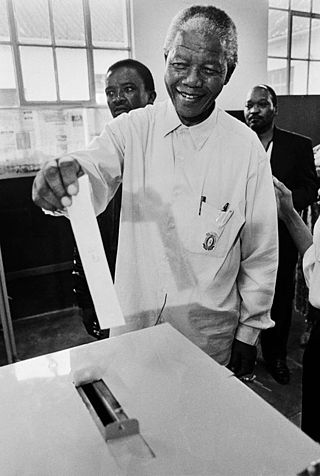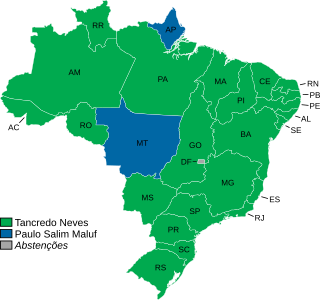
Democracy is a system of government in which state power is vested in the people or the general population of a state. Under a minimalist definition of democracy, rulers are elected through competitive elections while more expansive definitions link democracy to guarantees of civil liberties and human rights in addition to competitive elections.
The Republic of South Africa is a unitary parliamentary democratic republic. The President of South Africa serves both as head of state and as head of government. The President is elected by the National Assembly and must retain the confidence of the Assembly in order to remain in office. South Africans also elect provincial legislatures which govern each of the country's nine provinces.

Cuba has had a socialist political system since 1961 based on the "one state – one party" principle. Cuba is constitutionally defined as a single party Marxist–Leninist socialist republic with semi-presidential powers. The present Constitution of Cuba, which was passed in a 2019 referendum, also describes the role of the Communist Party of Cuba to be the "leading force of society and of the state" and as having the capability of setting national policy, and First Secretary of the Communist Party is the most powerful position in Cuba. The 2019 Constitution of Cuba identifies the ideals represented by Cuban independence hero José Martí and revolutionary leader Fidel Castro as the primary foundation of Cuba's political system, while also stressing the importance of the influence of the ideas of Marx, Engels, and Lenin.

In the United States, the Electoral College is the group of presidential electors that is formed every four years for the sole purpose of voting for the president and vice president. The process is described in Article II of the U.S. Constitution. Each state appoints electors using legal procedures determined by its legislature, equal in number to its congressional delegation totaling 535 electors. A 1961 amendment granted the federal District of Columbia three electors. Of the current 538 electors, a simple majority of 270 or more electoral votes is required to elect the president and vice president. If no candidate achieves a majority there, a contingent election is held by the House of Representatives to elect the president and by the Senate to elect the vice president. Federal office holders, including senators and representatives, cannot be electors.

The Legislative Yuan is the unicameral legislature of the Republic of China (Taiwan) located in Taipei. The Legislative Yuan is composed of 113 members, who are directly elected for four-year terms by people of the Taiwan Area through a parallel voting system.
Direct election is a system of choosing political officeholders in which the voters directly cast ballots for the persons or political party that they desire to see elected. The method by which the winner or winners of a direct election are chosen depends upon the electoral system used. The most commonly used systems are the plurality system and the two-round system for single-winner elections, such as a presidential election, and proportional representation for the election of a legislature or executive.
An indirect election or hierarchical voting, is an election in which voters do not choose directly among candidates or parties for an office, but elect people who in turn choose candidates or parties. It is one of the oldest forms of elections and is used by many countries for heads of state, cabinets, heads of government, and/or upper houses. It is also used for some supranational legislatures.

Elections in Angola take place within the framework of a multi-party democracy. The National Assembly is directly elected by voters, while the leader of the party or coalition with the most seats in the National Assembly automatically becomes President.

The state of Democracy in Middle East and North Africa can be comparatively assessed according to various definitions of democracy. According to The Economist Group's Democracy Index 2023 study, Israel is the only democratic country in the region, qualified as a "flawed democracy". According to the V-Dem Democracy indices, the Middle Eastern and North African countries with the highest scores in 2024 are Israel, Tunisia and Iraq.

The National Assembly of People's Power is the supreme organ of power of the Republic of Cuba. It is the only branch of government in the state, and per the principle of unified power, all state organs are subservient to it. It is currently composed of 470 representatives who are elected from multi-member electoral districts for a term of five years called consejos populares. The current President of the Assembly is Esteban Lazo Hernández. The Assembly only meets twice a year, with the 31-member Council of State exercising legislative power throughout the rest of the year. The most recent elections were held on 26 March 2023. The number of deputies was reduced from 605 to 470 for the 2023 election.

The Senate of Zimbabwe is the upper of the two chambers in Zimbabwe's Parliament. It existed from independence in 1980 until 1989, and was re-introduced in November 2005. The other chamber of Parliament is the National Assembly.

A referendum on the method of the election of the president was held in France on 28 October 1962. The question was whether to have the President of the French Republic elected by direct popular vote, rather than by an electoral college. It was approved by 62.3% of voters with a 77.0% turnout. The reform was controversial because it strengthened the executive at the expense of Parliament, and because of the disputed constitutionality of the procedure used.

Since its independence from Portugal in 1975, Angola has had three constitutions. The first came into force in 1975 as an "interim" measure; the second was approved in a 1992 referendum, and the third one was instituted in 2010.

Steven Levitsky is an American political scientist and Professor of Government at Harvard University.

Presidential elections were held in Brazil on 15 January 1985, the last to be held indirectly through an electoral college, and the last to be held under the military regime. The electoral college system was put in place so that the military elite that controlled the government could secure the election of the candidate chosen by the High Command of the Armed Forces as President. However, in 1985, due to the process of negotiated transition to democracy that started in the late 1970s, the politicians in the electoral college were placed under no coercion, and were allowed to choose the president of their choice.

The United States Senate is the upper chamber of the United States Congress. The United States Senate and the lower chamber of Congress, the United States House of Representatives, comprise the federal bicameral legislature of the United States. Together, the Senate and the House maintain authority under Article One of the U.S. Constitution to pass or defeat federal legislation. The Senate has exclusive power to confirm U.S. presidential appointments, approve or reject treaties, and try cases of impeachment brought by the House. The Senate and the House provide a check and balance on the powers of the executive and judicial branches of government.

The Constitution of 1961 was the fundamental law of South Africa for two decades. Under the terms of the constitution South Africa left the Commonwealth and became a republic.

How Democracies Die is a 2018 comparative politics book by Harvard University political scientists Steven Levitsky and Daniel Ziblatt about democratic backsliding and how elected leaders can gradually subvert the democratic process to increase their power. The book also offers stark warnings about the impact of the Republican Party and Donald Trump's presidency on U.S. democracy.

Daniel Ziblatt is an American political scientist who has been Eaton Professor of the Science of Government at Harvard University since 2018.

Democratic backsliding in the United States has been identified as a trend at the state and national levels in various indices and analyses. Democratic backsliding is "a process of regime change towards autocracy that makes the exercise of political power more arbitrary and repressive and that restricts the space for public contestation and political participation in the process of government selection".

















